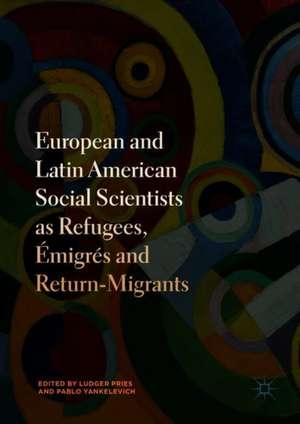European and Latin American Social Scientists as Refugees, Émigrés and Return‐Migrants
Editat de Ludger Pries, Pablo Yankelevichen Limba Engleză Hardback – 7 noi 2018
Comparing the first twenty years of these organizations, this book offers a deeper understanding of the corresponding institutional contexts and impacts of emigrated, exiled and refugeed academics. It analyses the ambiguities of scientists’ situations between emigration, return‐migration and transnational life projects and examines the corresponding dynamics of application, adaptation or amalgamation of (travelling) theories and methods these academics brought. Despite its institutional focus, it also deals with the broader context of forced migration of intellectuals and scientists in the second half of the last century in Europe and Latin America. In so doing, the book invites a deeper understanding of the challenges of forced migration for scholars in the 21st century.
Preț: 392.75 lei
Nou
Puncte Express: 589
Preț estimativ în valută:
75.15€ • 78.66$ • 62.55£
75.15€ • 78.66$ • 62.55£
Carte tipărită la comandă
Livrare economică 31 martie-14 aprilie
Preluare comenzi: 021 569.72.76
Specificații
ISBN-13: 9783319992648
ISBN-10: 3319992643
Pagini: 297
Ilustrații: XI, 301 p. 11 illus.
Dimensiuni: 148 x 210 x 24 mm
Greutate: 0.53 kg
Ediția:1st ed. 2019
Editura: Springer International Publishing
Colecția Palgrave Macmillan
Locul publicării:Cham, Switzerland
ISBN-10: 3319992643
Pagini: 297
Ilustrații: XI, 301 p. 11 illus.
Dimensiuni: 148 x 210 x 24 mm
Greutate: 0.53 kg
Ediția:1st ed. 2019
Editura: Springer International Publishing
Colecția Palgrave Macmillan
Locul publicării:Cham, Switzerland
Cuprins
Chapter 1. Exile Dynamics and Impacts of European Social Scientists since the 1930s: Transnational Lives and Travelling Theories at El Colegio de México and the New School for Social Research in New York.- Chapter 2. Crossroads: US and Mexican Reactions to Repression in Europe 1930-1939.- Chapter 3. Reflections on the New School’s Founding Moments, 1919 and 1933.- Chapter 4. Refugee Scholars and the New School for Social Research in New York after 1933: Intellectual Transfer and Impact.- Chapter 5. Agents” of “Westernization”?: The Impact of German Refugees of the Nazi Regime.- Chapter 6. The Holocaust and German-Jewish Culture in Exile.- Chapter 7. Waves of Exile: The Reception of Émigrés in Mexico, 1920-1980.- Chapter 8. International Rescue of Academics, Intellectuals and Artists from Nazism during the Second World War: The Experience of Mexico.- Chapter 9.The Institutional Reception of Spanish Émigré Intellectuals in Mexico: The Pioneering Role of La Casa de España, 1938-1940.- Chapter 10. Two Aspects of Exile.- Chapter 11. José Gaos and José Medina Echavarría: The Intellectual Vocation.- Chapter 12. The Constitution of Sociology at El Colegio de México: Two Key Intellectual Cohorts of Refugees and the Legacies They Left for Mexico and Latin America.- Chapter 13. Comparing Contexts, Institutions and Periods of the Émigrés’ Arrival and Possible Return.
Notă biografică
Ludger Pries is Chair for Sociology at Ruhr-Universität Bochum, Germany. His recent books include Refugees, Civil Society and the State. European Experiences and Global Challenges (2018), Refugee Protection and Civil Society in Europe (2018, Cross-border Staff Mobility. German and Mexican Profit- and Non-Profit-Organisations between Centre-Periphery and Transnationalization (2015), Shifting Boundaries of Belonging and New Migration Dynamics in Europe and China (2013).
Pablo Yankelevich is Professor at the Centro de Estudios Históricos of El Colegio de México, México. He is the editor of the Journal Historia Mexicana; the author of more than a hundred journal articles and book chapters; and author, coauthor, or editor of more than twenty books in English and Spanish.
Pablo Yankelevich is Professor at the Centro de Estudios Históricos of El Colegio de México, México. He is the editor of the Journal Historia Mexicana; the author of more than a hundred journal articles and book chapters; and author, coauthor, or editor of more than twenty books in English and Spanish.
Textul de pe ultima copertă
During the 1930s, thousands of social scientists fled the Nazi regime or other totalitarian European regimes, mainly towards the Americas. The New School for Social Research (NSSR) in New York City and El Colegio de México (Colmex) in Mexico City both were built based on receiving exiled academics from Europe.
Comparing the founding and first twenty years of these organizations, this book offers a deeper understanding of the corresponding institutional contexts and impacts of emigrated, exiled and refugeed academics. It analyses the ambiguities of scientists’ situations between emigration, return‐migration and transnational life projects and examines the corresponding dynamics of application, adaptation or amalgamation of (travelling) theories and methods these academics brought. Despite its institutional focus, it also deals with the broader context of forced migration of intellectuals and scientists in the second half of the last century in Europe and LatinAmerica. In so doing, the book invites a deeper understanding of the challenges of forced migration for scholars in the 21st century.
Ludger Pries is Chair for Sociology at Ruhr-Universität Bochum, Germany.
Pablo Yankelevich is Professor at the Centro de Estudios Históricos of El Colegio de México, México.
Comparing the founding and first twenty years of these organizations, this book offers a deeper understanding of the corresponding institutional contexts and impacts of emigrated, exiled and refugeed academics. It analyses the ambiguities of scientists’ situations between emigration, return‐migration and transnational life projects and examines the corresponding dynamics of application, adaptation or amalgamation of (travelling) theories and methods these academics brought. Despite its institutional focus, it also deals with the broader context of forced migration of intellectuals and scientists in the second half of the last century in Europe and LatinAmerica. In so doing, the book invites a deeper understanding of the challenges of forced migration for scholars in the 21st century.
Ludger Pries is Chair for Sociology at Ruhr-Universität Bochum, Germany.
Pablo Yankelevich is Professor at the Centro de Estudios Históricos of El Colegio de México, México.
Caracteristici
The first book-length comparison of the founding principles of The New School of Social Research and El Colegio de México Applies recent transnationalism research and work on travelling theories to these educational organizations Traces the effects of the migration of social scientists in both the home and the receiving countries
